Anxiety does not define a person
Anxiety is a normal and even helpful emotion that we all experience. Sometimes, though, it can cross the line into generalized anxiety disorder. The idea that an anxiety disorder doesn’t define you is perhaps one of the hardest things to explain to people who don’t suffer from anxiety. Contrary to what some people believe, an anxious person is much more than his or her mental state. Anxiety is a mental health disorder and ought to be treated as such. Why? Julia Breur, PhD, a licensed marriage and family therapist with a private clinical psychotherapy practice in Boca Raton, Florida, says untreated anxiety disorders may prevent you from “engaging in family and other social relationships, attending to work or school requirements or even enjoying normal daily activities.” If you’re curious about your mental health, these are some signs you might have an anxiety disorder.
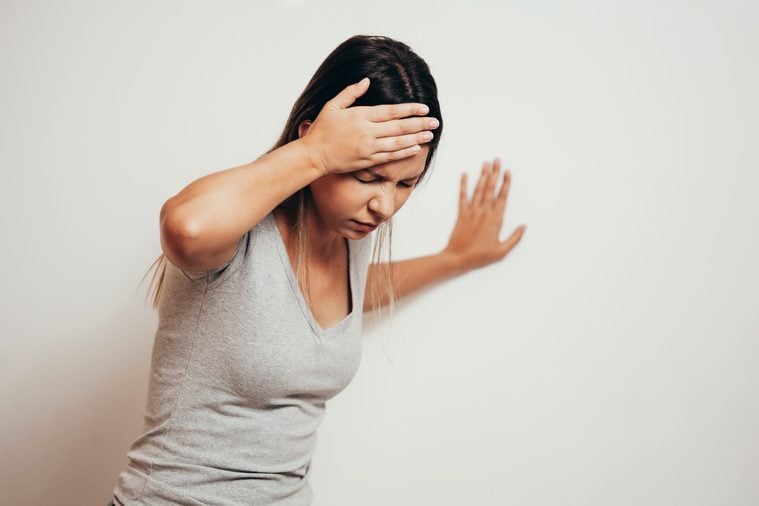
The effects of anxiety can be physical
Let’s be clear: Even though anxiety is a mental health disorder, it’s not just something that just affects your mind. Anxious feelings can manifest physically—sometimes severely. For example, Dr. Breur says someone suffering from a panic attack may feel dizzy, shaky, or short of breath. Panic can be a type of anxiety or a separate disorder. Physical symptoms of generalized anxiety disorder commonly manifest as chest tightness, muscle tension, irritability, restlessness, and feeling “keyed up.” To ease anxiety before such symptoms strike, try these natural remedies for anxiety symptoms.

Millions of Americans have anxiety
If you think that anxiety only affects a handful of people, think again. There are a whopping 40 million U.S. adults suffering from anxiety disorders, according to the Anxiety and Depression Association of America. Yet since there still tends to be a stigma associated with the condition, it can be harrowing to admit that you’re a sufferer. Here are 16 quotes to help you cope with anxiety a little better.
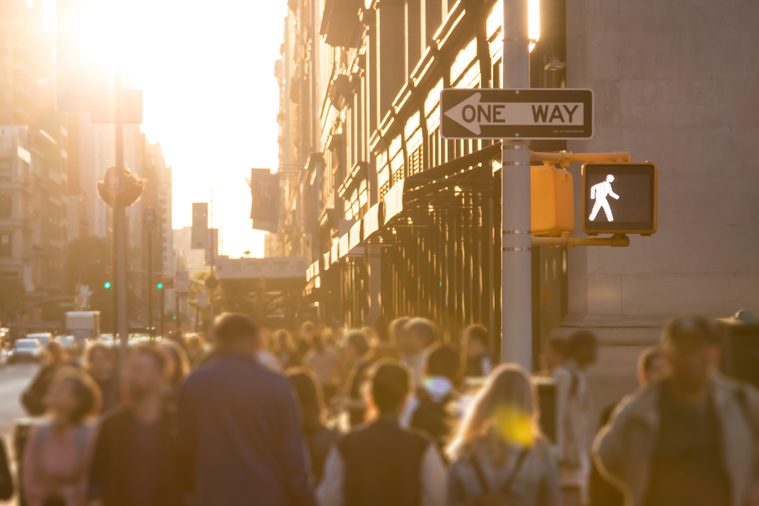
In fact, it’s the most common mental illness in America
You might think that depression is the most common mental illness in this country, but that distinction belongs to anxiety. The Anxiety and Depression Association of America (ADAA) notes that anxiety disorders are the most common mental illness in the U.S. There can, however, be an association between anxiety and depression. “It’s not uncommon for someone with an anxiety disorder to also suffer from depression or vice versa,” according to the ADAA. If you’re unsure, here’s how to tell the difference between depression and anxiety.
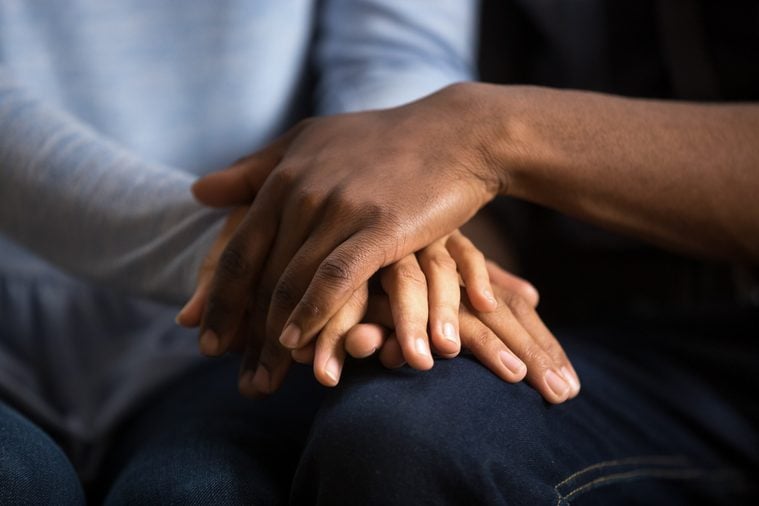
Just because a fear is irrational doesn’t mean it’s not real
“Each individual experiences anxiety in a unique way,” says Dr. Breur. “What may appear to be irrational fears can truly be actual fears to the individual experiencing anxiety.” Therefore, resist the urge to think that someone with anxiety is stressing over nothing. Even very strange phobias you probably never knew existed can be very real to people, and it’s upsetting to be told their fears are ludicrous. “As a licensed marriage and family therapist, I work with individuals experiencing anxiety and fears using Cognitive Behavioral Therapy where I review the patient’s thoughts, feelings and behaviors relating to their anxiety disorder.” Dr. Breur adds that she also uses exposure therapy, which she says “involves exposing the target patient to the anxiety source or its context without the intention to cause any danger.” Here are more top tricks from therapists on how to deal with anxiety.

Panic attacks are overwhelming
If you have anxiety, you may also experience panic attacks. “A panic attack is an abrupt surge of intense fear or intense discomfort that reaches a peak within minutes,” explains Dr. Breur. She says that several physical and cognitive symptoms may occur. Signs of a panic attack include, but aren’t limited to, heart palpitations, shaking, nausea, dizziness, and a fear of “going crazy” or dying. Repeat these phrases to instantly calm your anxiety and regain control.
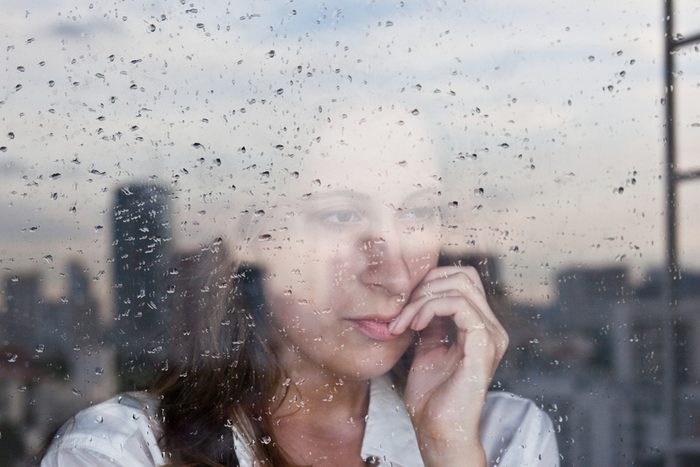
If you have anxiety, you may also have depression
It’s not uncommon to have anxiety and also suffer from depression. In fact, experts at the Mayo Clinic say that anxiety may arise as a symptom of clinical depression. At the same time, it’s not unusual to have depression that is triggered by anxiety. “Many people have a diagnosis of both an anxiety disorder and clinical depression,” the Mayo Clinic notes. If you think you could be one of those people, learn the warning signs you might be depressed.
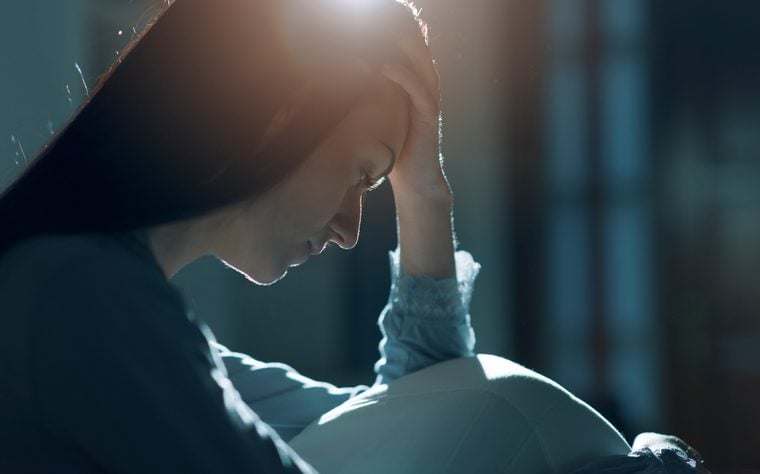
Anxiety attacks often happen at night
It’s not unusual for anxiety to strike at night. After all, when you’re trying to fall asleep, you don’t have the distractions that may have kept your focus off of certain worries. At night, you seem to have all the time in the world to explore your anxieties. Plus, the Anxiety and Depression Association of America notes that “stress and anxiety may cause sleeping problems or make existing problems worse.” It can be a vicious cycle. If you can’t doze off, try these sleep tricks that really work.
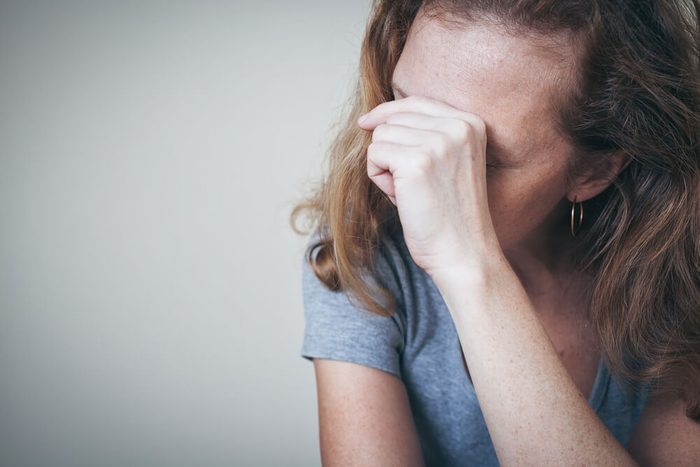
No, you can’t just “get over it”
As an anxiety sufferer, one of the most infuriating suggestions you can hear is that you ought to simply “get over” your illness. “Seeing a family member or friend experience an anxiety disorder is painful and knowing how best to respond is important,” Dr. Breur says. She suggests asking, “What can I do to help you right now?” or “Would it help if I just sat next to you or nearby now?” These are just a couple of ways to learn more about a person’s needs while demonstrating that you care. Dr. Breur says to refrain from saying things like “everyone experiences anxiety” and “stop worrying so much.” Here are some more things you should never say to people with anxiety.

Attacks can come out of the blue
Dr. Breur says that panic attacks fall under the anxiety disorder umbrella and involve a “sudden episode of intense fear that triggers severe physical reactions when there is no real danger or apparent cause.” The out-of-the-blue nature of these attacks can make it challenging, if not impossible, to predict when or how they will rear their heads. In a sense, that’s what makes suffering from this illness so difficult. It’s true, though, that there are some everyday habits that could trigger a panic attack.

Not everyone with anxiety gets treatment
The number of people getting regular treatment for their anxiety is shockingly low when you consider the fact that it’s the most common mental illness in the U.S. In reality, only about a third of sufferers get the anxiety treatment they so desperately need, according to the Anxiety and Depression Association of America. That means two-thirds of sufferers are living under the shadow of this illness alone. If you suspect you’re suffering from anxiety, you might consider seeing a therapist or medical professional. In the meantime, it can help to memorize these magic phrases for calming anxiety.

It’s not just a state of mind
Perhaps one of the greatest and most problematic misconceptions about an anxiety disorder is that it’s merely a state of mind. “Many people believe that having anxiety is no big deal,” says Dr. Breur. “They think it’s a normal, everyday type of worry that everyone experiences.” But people with anxiety know otherwise. “It’s not just a state of mind. It’s a mental health disorder that can esccalate over time if not treated.” To make matters worse, she says such escalation may lead to depression and substance abuse issues.

There are ways of managing it
There are a few effective ways to manage anxiety. Each individual needs a different level of care, and your doctor will be able to help you determine the best course of action. According to the Anxiety and Depression Association of America, therapy, medication, and complementary and alternative treatment have been effective treatment options. Talk therapy, exercise, good sleep hygiene, a low-carb and high-protein diet along with stress management are also at the forefront of treatment for generalized anxiety disorder.

Sometimes, it’s the stigma that hurts the most
The stigma of struggling with mental health issues is often what hurts and hinders the recovery process the most. There are many people with anxiety who genuinely feel powerless over their illness since they don’t want to actually admit they’re a sufferer. In fact, an American Psychiatric Association poll released in 2018 found that most people surveyed “wouldn’t vote for a candidate for elected office who has been diagnosed with a mental illness, even if the candidate had been treated for it.” The answer is education; get started with the 9 things everyone should know about coping with anxiety, according to crisis counselors.
